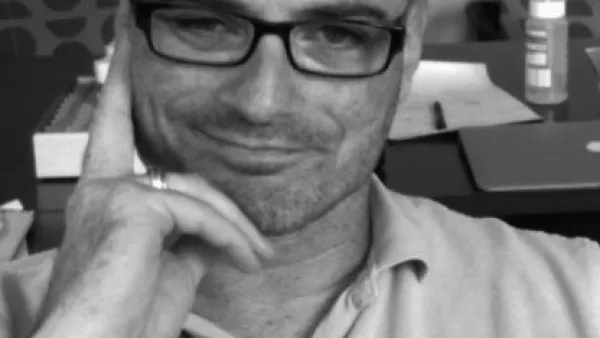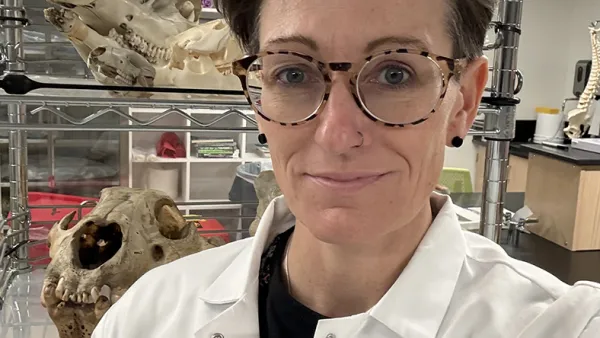Erik Herzog grew up in the woods near Madison, Wisconsin. He studied Biology and Spanish as an undergraduate at Duke University and Neuroscience as a graduate student with Prof. Robert Barlow at Syracuse University, followed by postdoctoral research with Prof. Gene Block at the University of Virginia. His interest in chronobiology stems from early work as an undergrad at the Duke Marine Lab.

In 2000, Prof. Herzog started his lab at Washington University. His laboratory discovered mechanisms underlying how circadian clocks regulate physiology, behavior and health. Supported by grants from agencies including the National Institutes of Health and the March of Dimes, the lab has published over 100 peer-reviewed articles. Current projects include:
-identifying the neural code used by neurons to release neuropeptides that synchronize circadian cells
-testing the role of maternal and fetal circadian tissues in timing birth
-establishing the ionic basis for daily rhythms in neuronal excitability
-mapping the connections and cell types that underlie daily rhythms as a function of age, sex and seasons.
Prof. Herzog is a biology major advisor, a Bio 200/500 Independent Research mentor, and teaches Bio 404 Laboratory of Neurophysiology which, among other things, teaches students how to record electrical activity of cells to learn principles of the nervous system, and Bio 3040: Biological Clocks which examines how biological rhythms are generated and regulated.
Prof. Herzog is a passionate advocate for science education in the greater community and has been involved in a number of outreach initiatives. In 2007, he reactivated the St. Louis Chapter of the Society for Neuroscience (SfN). The Chapter now has ~450 members. He coordinates the annual St. Louis Area Brain Bee, Amazing Brain Carnival, HealthyU, Brain Matters, Brain Awareness Week, and other events informing the public about brain research and mental health initiatives in St. Louis. The SfN St. Louis Chapter has developed training on “Science Communication” for graduate students and produced exhibits and demonstrations which have premiered at events including SciFest and Neuroday. The Society for Neuroscience and the Dana Foundation have recognized the Chapter with many travel awards, outreach grants and awarded Prof. Herzog with Teacher of the Year. He has been teaching a course called “The Teen Brain” to high school teachers every other summer for the past decade and helped to organize international chronobiology summer schools in Estonia, India, Germany, Argentina, Japan, China and the United States.
Recently Prof. Herzog has turned his attention to increasing voter turnout amongst the undergrad population. He is part of a group of faculty and staff members in the biology department dedicated to increasing voter engagement in partnership with WashU’s Gephardt Institute for Civic Engagement. The group promotes events and passes on important information about registration deadlines and election dates through digital publications, emails and seminar screens as well as encouraging faculty members to build voter engagement into curriculum using research and ideas provided by Gephardt Institute: https://gephardtinstitute.wustl.edu/for-students/engage-democracy/voter-engagement/. Prof. Herzog has become a notary as part of this effort, one extra step that makes it easier for undergrads with full busy schedules to vote by mail.
“For the past ~20 years, I have taught the Lab of Neurophysiology which runs from 9am-6pm on Tuesdays in the fall. This demands a lot of the students (and instructors) including making it difficult to vote in person on election day. This year, I wanted to do my part to make it easier for students (and others) to vote. In MO, if you vote absentee, you need your ballot notarized.”
Believe it or not, in addition to all of the research, teaching and outreach activities that Prof. Herzog does, he still has time to ride his bike. On September 26, he will ride for 100 miles to raise awareness and funds for research and treatments for patients with multiple sclerosis, which he has been doing annually for 14 years!
How does he do it all? When asked how we can best follow our biological clocks to be the most productive individuals possible, Prof. Herzog advises: “Well, I am certainly not the ideal role model! That said, I recommend that we all get rid of our alarm clocks. If you can wake up naturally, you are listening to your body clock. To help, it is good to have your bed by a window so you get sunlight in the morning. Try to avoid screens (computers, phones) during the evening, especially 6p-12a, if you are having trouble waking in the morning.”
To learn more about Erik Herzog and his lab, visit https://sites.wustl.edu/herzoglab/.



